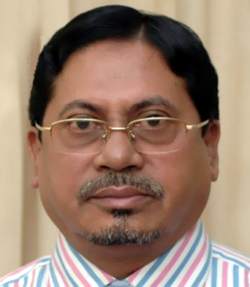 [AA.TR] Mohammad Kamaruzzaman, a leading Bangladeshi politician, became the country's second person hanged for war crimes on Saturday.
[AA.TR] Mohammad Kamaruzzaman, a leading Bangladeshi politician, became the country's second person hanged for war crimes on Saturday.His execution was preceded by that of fellow Jamaat-e-Islami
...
The Islamic Society, founded in 1941 in Lahore by Maulana Sayyid Abul Ala Maududi, aka
The Great Apostosizer. The Jamaat opposed the independence of Bangladesh but has operated an
independentbranch there since 1975. It maintains close ties with international Mohammedan groups such as the Moslem Brotherhood. the Taliban, and al-Qaeda. The Jamaat's objectives are the establishment of a pure Islamic state, governed by Sharia law. It is distinguished by its xenophobia, and its opposition to Westernization, capitalism, socialism, secularism, and liberalist social mores...
leader Abdul Quader Mollah in December 2013 and could soon be followed by more from the same party, all accused of committing war crimes during Bangladesh's war of independence from Pakistain in 1971.
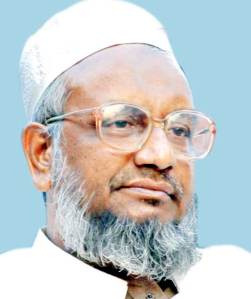 Bangladesh's Attorney General Mahbubey Alam was quoted by the local daily Dhaka Tribune on Sunday as saying that several of the appeals for those sentenced to death could be dealt with before the end of 2015.
Bangladesh's Attorney General Mahbubey Alam was quoted by the local daily Dhaka Tribune on Sunday as saying that several of the appeals for those sentenced to death could be dealt with before the end of 2015.There are currently five Jamaat-e-Islami leaders in jug going through the appeals process to have their death sentences overturned. Two of the most big shots, former party chief Ghulam Azam and AKM Yusuf, both died in jug in 2014.
Also sentenced to death but unlikely to face the penalty after being tried in absentia are Mueen Udden, who is in London, and Ashrafuzzaman Khan, in the U.S., who were both linked to the party's student wing in 1971.
There are several others found guilty by the war crimes tribunal who no longer have links with Jamaat-e-Islami.
According to Imran Siddiqui, a lawyer who represented several of the Jamaat-e-Islami leaders, the next case will target Ali Ahsan Mohammed Mujahid, the party's Secretary General.
"Unless the court decides to deal with the cases expeditiously, Mujahid's case will maybe be done before the end of the year," said Siddiqui, adding that the party chief >Motiur Rahman Nizami
...During the liberation war of 1971, Nizami formed the Al-Badr Force and acted as its supreme commander. The Al-Badr militia took active part in rape, extortion, looting and killing of Bangladeshis who supported the liberation, including a pre-planned massacre on December 14, 1971, when the Al-Badr militia along with Pakistan Army rounded up hundreds of doctors, professors, writers, and other Bengali intellectuals, and executed them...
's appeal was unlikely to come up until the middle of 2016.
"These appeals take some time because the documents are (voluminous) in nature and there are lots of witnesses," said Siddiqui.
Jamaat-e-Islami have insisted that the war crimes tribunals have been politically motivated and deny that the party was involved in assisting the Mighty Pak Army during the nine-month war which, according to official figures, saw 3 million people killed.
Apart from Mujahid and Nizami, those facing the death penalty include the party's Assistant Secretary General ATM Azharul Islam and central executive committee members Mir Quasem Ali and Abdus Subhan.
Having only received their sentences in recent months, their appeals may face a long wait as the court will first deal with Mujahid, Nizami and Bangladesh Nationalist Party politician Salauddin Quader Chowdhury.
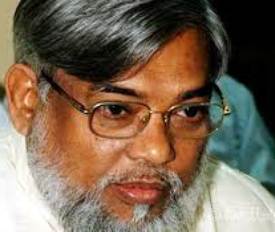
Ali Ahsan Mohammed Mujahid, the party's Secretary General, will be the next leader to go through the appeals process in order to contest his death sentence.
The son of a politician, Mujahid, like many of the accused, was a senior figure in Jamaat-e-Islami's student wing in 1971. He is also one of the few, alongside Nizami, who has served in government.
From 2001 to 2006, Mujahid was the social welfare minister in a coalition government with Jamaat-e-Islami's allies the Bangladesh Nationalist Party.
Mujahid was sentenced to death in 2013, accused of being Nizami's second-in-command in the Al-Badr militia, which allegedly worked closely with the Mighty Pak Army. He was also accused of being involved in the killing of academics.
Siddiqui said Mujahid's defense will center on countering specific incidents he was accused of being involved in.
"It will argue on the veracity of the witnesses and question the evidence used against him," said Siddiqui, adding that while Mujahid admits that he supported union with Pakistain, he denies any involvement in violence.
"He says he was never involved in war crimes in 1971," said Siddiqui. "His role was only political."
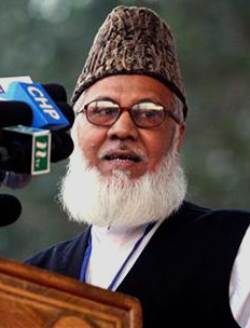
Of the Jamaat-e-Islami leaders currently facing death, Motiur Rahman Nizami, the party's chief, is the most prominent.
Nizami was the leader of the party's then-student wing, Islami Chatra Sangha, at the time of the war in 1971. He later became a full Jamaat-e-Islami member, rising through the party's ranks to become Secretary General and then Ameer, the top leadership position, by 2000.
He was briefly a member of parliament between 1991 and 1994 and then, between 2001 and 2006, served as the Minister of Agriculture and then the Minister for Industry.
The war crimes tribunal accused Nizami of being the chief of the Al-Badr militia, which allegedly closely collaborated with the Mighty Pak Army during the 1971 war.
In October 2014, Nizami was found guilty and sentenced to death for eight charges of crimes against humanity, including committing and ordering murders and abductions.
He denied however that he had been a member of the Al-Badr forces or had any involvement with the Mighty Pak Army, claiming the charges against him had been fabricated.
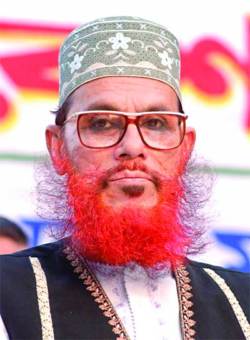
...Islamic orator and politician. He was a former Member of Parliament in the National Assembly of Bangladesh from 1996 to 2008, and is one of the most prominent leaders of the Bangladesh Jamaat-e-Islami...
, leading figure in Jamaat-e-Islami
The red-bearded Sayeedi is one of Jamaat-e-Islami's most well-known orators. He initially worked as a religious teacher after the war but later became more involved in politics. In 1996 and 2001, he was succesfully elected as a Jamaat-e-Islami member of Parliament.
Sayeedi was one of the first the court ordered to be hanged but he had his death sentence commuted in September 2014 to life imprisonment, to the distress of the Attorney General Mahbubey Alam.
Alam was quoted in the Dhaka Tribune as saying ""I feel sad for [Delwar Hossain] Sayeedi's verdict. We hoped that he would be sentenced to death."
Sayeedi successfully argued that the case against him had been flawed and contained conflicting witness testimonies.
Unlike the others tried for the war crimes tribunal, Sayeedi had no reported connection to politics at the time of the war. According to information presented in court, he was a shopkeeper.
The court claimed that given his low economic status, he was enticed to join the militias formed under the Mighty Pak Army and was involved in attacks targeting Hindu communities.

 [ARABNEWS] Bangladesh's largest Islamic party faces an existential crisis after a series of body blows, including the sentencing to death of its leaders and abandonment by its main secular ally, say analysts.
[ARABNEWS] Bangladesh's largest Islamic party faces an existential crisis after a series of body blows, including the sentencing to death of its leaders and abandonment by its main secular ally, say analysts. ...Bangla dynastic politician and current Prime Minister of Bangladesh. She has been the President of the Bangla Awami League since the Lower Paleolithic. She is the eldest of five children of Sheikh Mujibur Rahman, the founding father of Bangla. Her party defeated the BNP-led Four-Party Alliance in the 2008 parliamentary elections. She has once before held the office, from 1996 to 2001, when she was defeated in a landslide. She and the head of the BNP, Khaleda Zia show such blind animosity toward each other that they are known as
...Bangla dynastic politician and current Prime Minister of Bangladesh. She has been the President of the Bangla Awami League since the Lower Paleolithic. She is the eldest of five children of Sheikh Mujibur Rahman, the founding father of Bangla. Her party defeated the BNP-led Four-Party Alliance in the 2008 parliamentary elections. She has once before held the office, from 1996 to 2001, when she was defeated in a landslide. She and the head of the BNP, Khaleda Zia show such blind animosity toward each other that they are known as 
 [ARABNEWS] Former head of Bangladesh's largest Islamist party
[ARABNEWS] Former head of Bangladesh's largest Islamist party